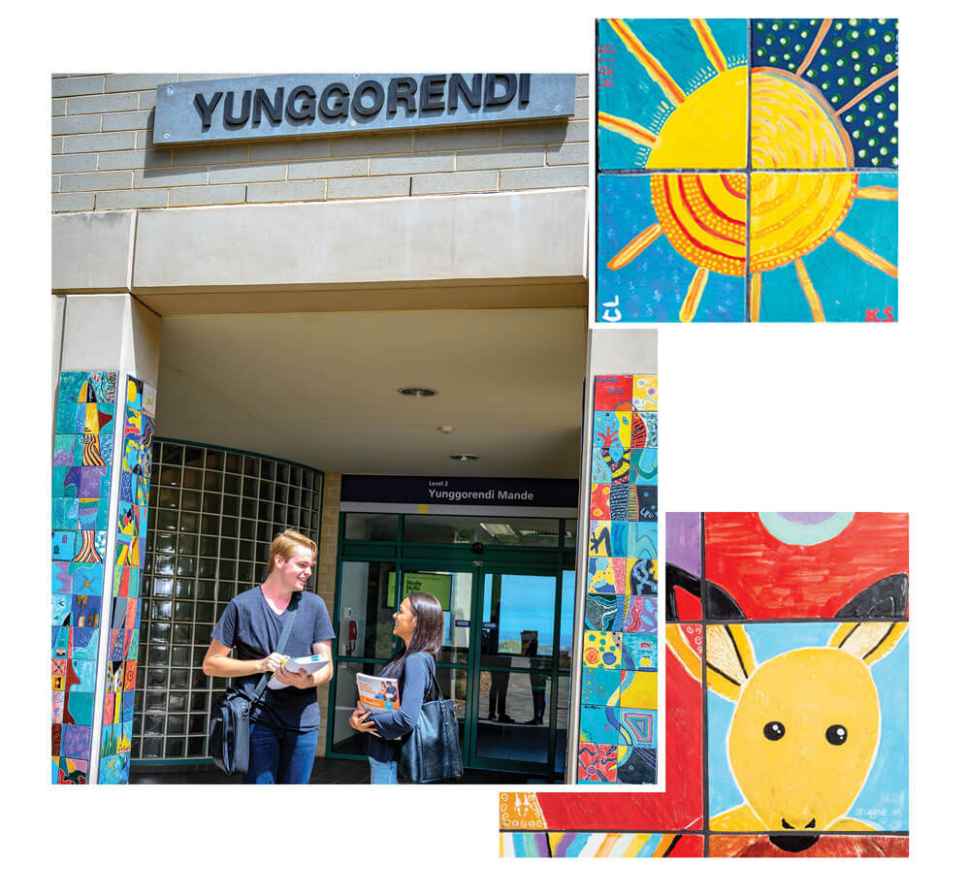What Reconciliation means to Flinders Community
Our vision is to establish Flinders University as a place where reconciliation is embedded in the lived actions of the Flinders community. We aim to do this by promoting social responsibility and accountability, underpinned by truth telling, mutual respect and understanding, that champions Aboriginal and Torres Strait Islander people’s self-determination.

Relationships
Flinders University recognises Aboriginal and Torres Strait Islander peoples as the First Peoples of this Country who hold distinct relationships with the land, sky and waters that has existed for time immemorial.
As a university we acknowledge this connection to Country, and that long-held philosophies of this relationship and ways of knowing, being and doing offer a shared understanding and connection to Country, place, people, and community. Our ongoing path to reconciliation is a lived and authentic enactment, grounded in relationality.

| Action | Deliverable | Timeline | Responsibility |
|---|---|---|---|
| 1. Establish and maintain mutually beneficial relationships with Aboriginal and Torres Strait Islander stakeholders and organisations. | Maintain engagement with local Aboriginal and Torres Strait Islander communities across Flinders University footprint in South Australia and the Northern Territory (Arrernte, Dagoman, First Nations of the South East, First Peoples of the River Murray & Mallee region, Jawoyn, Kaurna, Larrakia, Ngadjuri, Ngarrindjeri, Ramindjeri, Warumungu, Wardaman and Yolŋu people’s) and organisations by co-designing guiding principles for future engagement. | June 2024, 2025 | Pro Vice-Chancellor (Indigenous) and Director, Poche SA + NT |
| Implement guiding principles to develop a community engagement plan for working with Aboriginal and Torres Strait Islander peoples. | January 2024 | Pro Vice-Chancellor (Indigenous) |
|
| 2. Build relationships through celebrating National Reconciliation Week (NRW). |
RAP Oversight Committee members to participate in an external National Reconciliation Week (NRW) event. | 27 May - 3 June 2024, 2025 |
Pro Vice-Chancellor (Indigenous) |
| Encourage and support staff and senior leaders to participate in at least one external event to recognise and celebrate NRW. | 27 May - 3 June 2024, 2025 |
Vice-Chancellor | |
| Develop an annual program of activities to engage students in Reconciliation. | 27 May - 3 June 2024, 2025 |
Deputy Vice-Chancellor (Students) | |
| Organise at least one NRW event each year. | 27 May - 3 June 2024, 2025 | Deputy Vice-Chancellor Students |
|
| Register all our NRW events on Reconciliation Australia's NRW website. | May 2024, 2025 | Director, Marketing | |
| Circulate Reconciliation Australia's NRW resources and Reconciliation materials to our staff to assist the development of an annual program of Reconciliation events. | May 2024, 2025 | Director, Marketing | |
| 3. Promote reconciliation through our sphere of influence. | Develop and implement an annual staff and student engagement plan to raise awareness of Reconciliation across our University. | April 2024, 2025 | Director, Media and Communications |
| Communicate our commitment to Reconciliation publicly. | May 2024, 2025 | Vice-Chancellor | |
| Explore opportunities to positively influence our external stakeholders to drive reconciliation outcomes. | May 2024, 2025 | RAPOC | |
| Continue to collaborate with RAP organisations and other like-minded organisations to develop innovative approaches to advance reconciliation. | Feb, May, Sept, Dec, 2024, 2025 | RAP Project Officer | |
| Ensure that the University’s Policy Framework incorporates a requirement to consult and consider Aboriginal and Torres Strait Islander perspectives so that these perspectives are taken into account as policies and procedures are routinely reviewed and developed. | June 2024, 2025 | General Counsel and University Secretary | |
| Maintain membership and engagement with established industry RAP networks at the national and state levels, including current partners, sponsors, and sponsorships | June 2024, 2025 | Pro Vice-Chancellor (Indigenous) | |
| 4. Promote positive race relations through anti-discrimination strategies. | Conduct a review of People and Culture policies and procedures to identify existing anti-discrimination provisions, and future needs. | December 2023, 2025 | Director, People and Culture |
| Develop, implement, and communicate an anti-racism statement. | July 2023 | Vice-Chancellor | |
| Develop an anti-discrimination policy for our organisation. | July 2023 | Vice-Chancellor | |
| Engage with Aboriginal and Torres Strait Islander staff and/or Aboriginal and Torres Strait Islander advisors to consult on our anti-discrimination policy. | January 2024 | Pro Vice-Chancellor (Indigenous) and Vice-President and Pro Vice-Chancellor (International) | |
| Investigate and plan cultural capability workshops for all staff, including senior leadership. | December 2023 | Director, People and Culture | |
| Provide an anti-racism program to senior leaders that promotes the national ‘Call it Out’ Racism Register to raise awareness about the impacts of racism. | December 2024 | Director, People and Culture | |
| Promote the national ‘Call it Out’ Racism Register to all University staff and students. | December 2025 | Director, People and Culture |
Respect
Flinders University respects and recognises the long-held philosophies, knowledges, research strengths and contributions of Aboriginal and Torres Strait Islander communities in Australia. The University acknowledges that Aboriginal and Torres Strait Islander peoples have always been self-determining and through shared understanding of cultures, histories, and lived experiences, an appreciation of the contributions to this country and specifically to the University community are recognised and celebrated.
Through the fostering of reciprocal relationships and understanding, the University is committed to establishing productive, mutually beneficial, and ethical partnerships. The University recognises its responsibility and contribution to truth-telling with a shared purpose that informs and fosters transformation, grounded in humility, a culture of shared trust, and the bearing of the weight of colonialism in Australia.

| Action | Deliverable | Timeline | Responsibility |
|---|---|---|---|
| 5. Increase understanding, value and recognition of Aboriginal and Torres Strait Islander cultures, histories, knowledge and rights through cultural learning. |
Conduct a review of cultural learning needs within our organisation to analyse requirements across our cohorts to target appropriate initiatives. | December 2023 | Deputy Vice-Chancellor (Students) |
| Consult local Traditional Owners and/or Aboriginal and Torres Strait Islander advisors to inform cultural learning. | June 2023, 2025 | Pro Vice-Chancellor (Indigenous) | |
| Develop, implement and communicate a cultural learning document/resource for our staff and students. | December 2023 | Deputy Vice-Chancellor (Students) | |
| Promote on-Country practices, language and cultural immersion initiatives, and two-way learning exchanges. | May 2024, 2025 | Pro Vice-Chancellor (Indigenous) | |
| Provide opportunities for RAP Working Group members, senior People and Culture staff and other key leadership staff to participate in formal and structured cultural learning. | June 2024, 2025 | Director, People and Culture | |
| Develop and implement guiding principles for protocols of engagement with Traditional Owners regarding future infrastructure projects. | June 2024 | Vice-President Corporate Services | |
| Scope the appointment of a senior Aboriginal and Torres Strait Islander Academic Teaching and Learning Lead to facilitate the embedding of Aboriginal and Torres Strait Islander perspectives into the curriculum. | December 2023 | Deputy Vice-Chancellor (Students) | |
| Undertake an internal analysis of Indigenous knowledges and perspective within degree programs, benchmarking against best practices. | December 2023 | Pro Vice-Chancellor (Learning, Teaching and Innovation) | |
| Develop an Indigenous Studies curriculum thread offering within degree programs. | December 2024 | Pro Vice-Chancellor (Learning, Teaching and Innovation) | |
| Promote Cultural Learning protocols to students via online learning platform. | June 2024, 202 | ||
| 6. Demonstrate respect to Aboriginal and Torres Strait Islander peoples by observing cultural protocols. | Increase staff understanding of the purpose and significance of cultural protocols, including Acknowledgement of Country and Welcome to Country protocols. | May 2023, 2025 | Chief of Staff |
| Develop, implement and communicate a cultural protocol document, including protocols for Welcome to Country and Acknowledgement of Country | December 2024 | Pro Vice-Chancellor (Indigenous) |
|
| Invite a local Traditional Owner or Custodian to provide a Welcome to Country or other appropriate cultural protocol at significant events each year. | June 2023, 2025 | Vice-Chancellor | |
| Include an Acknowledgement of Country or other appropriate protocols at the commencement of important meetings. | June 2023, 2025 | University-wide | |
| Promote Elder-On-Campus program and Elders Network and consider expansion across the University’s footprint. | May 2024, 2025 | Pro Vice-Chancellor (Indigenous), and Vice-President and Executive Dean, College of Medicine and Public Health | |
| 7. Build respect for Aboriginal and Torres Strait Islander cultures and histories by celebrating NAIDOC week. | RAP Oversight Committee to participate in an external NAIDOC Week event. | July 2023, 2025 | RAPOC |
| Review People and Culture policies and procedures to remove barriers to staff participating in NAIDOC Week. | December 2023 | Director, People and Culture | |
| Promote and encourage participation in external NAIDOC events to all staff and students. | June 2023, 2025 | Director, Media and Communications |
Opportunities
The University’s strategic plan Making a Difference – The 2025 Agenda affirms its commitment to advancing the Aboriginal and Torres Strait Islander workforce development, community participation, retention, and success in higher education. Contributions by Aboriginal and Torres Strait Islander people both within the University and beyond are essential in creating an environment that values connection to Country, community-centred initiatives, sustainability and innovation, creativity, and future visioning. Such contributions enrich the cultural fabric of the whole University. The University recognises that its systems and structures should be culturally inclusive and address barriers which may inhibit success.
This Innovate RAP will further increase staff and student knowledges and cultural capabilities through the sharing of Indigenous ways of Knowing, Being and Doing, co-design research and innovations, Indigenous procurement, and Indigenous contributions to University business.

| Action | Deliverable | Timeline | Responsibility |
|---|---|---|---|
| 8. Improve employment outcomes by increasing Aboriginal and Torres Strait Islander peoples’ recruitment, retention and professional development. |
Build understanding of current Aboriginal and Torres Strait Islander staffing profile to inform future employment and professional development opportunities. | December 2023, 2025 | Director, People and Culture |
| Engage with Aboriginal and Torres Strait Islander staff to consult on our recruitment, retention, and professional development strategy. | December 2023, 2025 | Director, People and Culture | |
| Develop and implement an Aboriginal and Torres Strait Islander recruitment, retention, and professional development strategy. | December 2023, 2025 | Director, People and Culture | |
| Advertise job vacancies to effectively reach Aboriginal and Torres Strait Islander stakeholders. | December 2023, 2025 | Director, People and Culture | |
| Review People and Culture recruitment procedures and policies to remove barriers to Aboriginal and Torres Strait Islander participation in our workplace. | December 2023, 2025 | Director, People and Culture | |
| Review current cultural leave policy to ensure alignment with contemporary practices. | December 2023, 2025 | Director, People and Culture | |
| 9. Increase Aboriginal and Torres Strait Islander supplier diversity to support improved economic and social outcomes. | Implement an Aboriginal and Torres Strait Islander procurement strategy. | June 2024 | Vice-President Corporate Services |
| Maintain Supply Nation membership. | December 2023, 2025 | Vice-President Corporate Services | |
| Invite a local Traditional Owner or Custodian to provide a Welcome to Country or other appropriate cultural protocol at significant events each year. | June 2023, 2025 | Vice-President Corporate Services | |
| Develop and communicate opportunities for procurement of goods and services from Aboriginal and Torres Strait Islander businesses to staff. | December 2023, 2025 | Vice-President Corporate Services | |
| Review and update procurement practices to remove barriers to procuring goods and services from Aboriginal and Torres Strait Islander businesses. | December 2024 | Vice-President Corporate Services | |
| Increase commercial relationships with Aboriginal and Torres Strait Islander businesses with annual incremental growths based on an analysis of our current partnerships. | December 2023, 2025 | Vice-President Corporate Services | |
| 10. Implement the University’s Indigenous Research Strategy 2023 – 2025 to enhance research capacity, engagement and leadership of Aboriginal and Torres Strait Islander staff and students. | Increase the success rate of Aboriginal and Torres Strait Islander academics in national and international competitive processes by offering support in preparing grant applications. | December 2025 | Deputy Vice-Chancellor (Research) |
| Scope the appointment of a senior Aboriginal and Torres Strait Islander Academic Research Lead to progress the University’s strategic agenda for Indigenous research. | December 2023 | Deputy Vice-Chancellor (Research) | |
| Develop a business case for competitive and innovative HDR scholarships for Aboriginal and Torres Strait Islander students and make recommendations to the Deputy Vice-Chancellor (Research). | December 2023 | Dean, Office of Graduate Research | |
| Promote University research strengths in Aboriginal and Torres Strait Islander research and in the Australian Research Council (ARC) Fields of Research, Indigenous Studies code. | December 2023, 2025 | Deputy Vice-Chancellor (Research) | |
| Support and monitor the mentoring of Indigenous researchers through the First Nations Researchers Collective. | November 2024, 2025 | Deputy Vice-Chancellor (Research) | |
| 11. Improve Aboriginal and Torres Strait Islander student recruitment, retention, completions rates. | Implement college and portfolio specific initiatives that align with Flinders University’s Indigenous Student Success Targets (2022-2025). | January 2024 | Deputy Vice-Chancellor (Students) |
| Develop an Indigenous student recruitment strategy. | November 2023, 2025 | Pro Vice-Chancellor (Indigenous) |
Governance
| Action | Deliverable | Timeline | Responsibility |
|---|---|---|---|
| 12. Establish and maintain an effective RAP Oversight Committee (RAPOC) to drive governance of the RAP. | Maintain Aboriginal and Torres Strait Islander representation on the RAP Oversight Committee and working groups. | February 2024, 2025 | RAPOC Co-Chairs |
| Maintain Terms of Reference for the RAPOC to reflect position and needs of the University. | February 2024, 2025 | RAPOC Co-Chairs | |
| Meet at least four times per year to drive and monitor RAP implementation. | March, July, September, December 2024, 2025 | RAPOC Co-Chairs | |
| Establish a student RAP group with representation on the RAPOC to provide feedback to student areas. | December 2023 | Deputy Vice-Chancellor (Students) | |
| 13. Provide appropriate support for effective implementation of RAP commitments. | Define resource needs for RAP implementation. | July 2024 | Vice-Chancellor |
| Engage our senior leaders and other staff in the delivery of RAP commitments. | June 2024, 2025 | Vice-Chancellor | |
| Define and maintain appropriate systems to track, measure and report on RAP commitments by a delegated officer within each college and portfolio. | June 2023, 2025 | RAPOC Co-Chairs | |
| Maintain internal RAP Champions from senior management. | February 2024, 2025 | Vice-Chancellor | |
| 14. Build accountability and transparency through reporting RAP achievements, challenges, and learnings both internally and externally. | Contact Reconciliation Australia to verify that our primary and secondary contact details are up to date, to ensure we do not miss out on important RAP correspondence. | June 2023, 2025 | RAP Project Officer |
| Contact Reconciliation Australia to request our unique link, to access the online RAP Impact Measurement Questionnaire. | August 2024, 2025 | RAP Project Officer | |
| Ensure that the annual RAP Impact Measurement Questionnaire is completed and submitted to Reconciliation Australia. | 30 September 2024, 2025 | Pro Vice-Chancellor (Indigenous) | |
| Report RAP progress to all staff and senior leaders quarterly. | March, July, September, December 2024, 2025 | RAPOC Co-Chairs | |
| Annually publish a report to publicly inform our achievements, challenges, and learnings of the RAP implementation. | June 2024, 2025 | RAPOC Co-Chairs | |
| Investigate participating in Reconciliation Australia’s biennial Workplace RAP Barometer. | May 2024 | Pro Vice-Chancellor (Indigenous) and Director, People and Culture | |
| Submit a traffic light report to Reconciliation Australia at the conclusion of this RAP. | June 2025 | RAPOC Co-Chairs | |
| 15. Continue our reconciliation journey by developing our next RAP. | Register via Reconciliation Australia’s website to begin developing our next RAP. | August 2024 | Pro Vice-Chancellor (Indigenous) |
| 16. Promote leadership and accountability of senior management towards reconciliation. | Provide responsive, relevant, and fearless leadership to university staff on RAP objectives that align with Key Performance Indicators. | June 2023, 2025 | Vice-Chancellor |
| Report progress against the University Australia’s Indigenous Strategy (2022-2025) focus areas and actions. | November 2023, 2025 | Vice-Chancellor | |
| Consider Indigenous representation on Flinders University Council and senior governance committees. | June 2023 | Vice-Chancellor |
Long way home
Insight into the ‘tile’ artwork featured throughout the Reconciliation Action Plan and website.
Yungkurrinthi is a special place. For Indigenous students new to university life, just how special becomes clear on a day in February every year. Tables are set-up outside, food is prepared, old hands and new join to make friendships…and art.
Stories and laughter are shared and each participant marks the occasion by etching and painting a tile.
Each tile finds its place in a mosaic of styles and colours to celebrate creativity, diversity and unity of purpose. The parts form an emblematic whole to be built into the material and cultural fabric of the Yungkurrinthi building. A home-away-from home is imagined, inscribed and identified this way.
I know the comfort this small ritual engenders because my tile is there to see, touch and talk about whenever I feel the need. I was gifted a place at the table – as a non-Indigenous staff member – and have a mark fused into the marks of others in a large and growing totemic expression of community context. This way of making art is a testament to enduring presence. It lends authority to the transforming acts of teaching and learning in a place dedicated to belonging and community.
The distance between self and home can seem vast but there are days, for all of us who have been privileged to share the space, when the art of Yungkurrinthi brings home closer and shows a better way of being where and who we are.
Gus Worby
Emeritus Professor
Yungkurrinthi
First printed in 2011 in Long Way Home - A celebration of 21 years of Yunggorendi First Nations Centre

Each tile finds its place in a mosaic of styles and colours to celebrate creativity, diversity and unity of purpose. The parts form an emblematic whole to be built into the material and cultural fabric of the Yunggorendi building.
